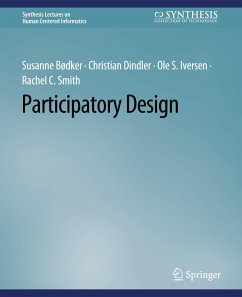
Designing for User Engagement
Aesthetic and Attractive User Interfaces

PAYBACK Punkte
0 °P sammeln!
This book explores the design process for user experience and engagement, which expands the traditional concept of usability and utility in design to include aesthetics, fun and excitement. User experience has evolved as a new area of Human Computer Interaction research, motivated by non-work oriented applications such as games, education and emerging interactive Web 2.0. The chapter starts by examining the phenomena of user engagement and experience and setting them in the perspective of cognitive psychology, in particular motivation, emotion and mood. The perspective of aesthetics is expande...
This book explores the design process for user experience and engagement, which expands the traditional concept of usability and utility in design to include aesthetics, fun and excitement. User experience has evolved as a new area of Human Computer Interaction research, motivated by non-work oriented applications such as games, education and emerging interactive Web 2.0. The chapter starts by examining the phenomena of user engagement and experience and setting them in the perspective of cognitive psychology, in particular motivation, emotion and mood. The perspective of aesthetics is expanded towards interaction and engagement to propose design treatments, metaphors, and interactive techniques which can promote user interest, excitement and satisfying experiences. This is followed by reviewing the design process and design treatments which can promote aesthetic perception and engaging interaction. The final part of the chapter provides design guidelines and principles drawn from theinteraction and graphical design literature which are cross-referenced to issues in the design process. Examples of designs and design treatments are given to illustrate principles and advice, accompanied by critical reflection. Table of Contents: Introduction / Psychology of User Engagement / UE Design Process / Design Principles and Guidelines / Perspectives and Conclusions












